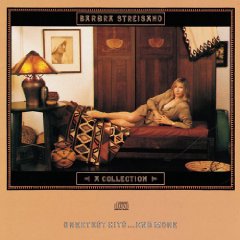
A Collection: Greatest Hits...and More is the fourth greatest hits album recorded by American vocalist Barbra Streisand. It was released on October 3, 1989 by Columbia Records. The compilation features ten songs from Streisand's career, dating from 1975 to 1988, plus two previously unreleased songs: "We're Not Makin' Love Anymore" was released as the album's lead single on September 14, 1989, and "Someone That I Used to Love" was distributed as the second and final one in 1989. Both singles charted on several record charts internationally.

"Shake Me, Wake Me " is a song recorded by the American quartet Four Tops for their third studio album, On Top (1966). It was released in February 1966 as a 7" vinyl single through Motown records. It was written and produced by Brian Holland, Lamont Dozier, and Eddie Holland. A gospel rock track, its lyrics detail a relationship that has ended. It has since been regarded as one of Four Tops' most successful singles ever. It charted moderately well in both the United States and Canada, and became the group's fifth consecutive entry to chart within the top five of the Hot R&B/Hip-Hop Songs chart. Four Tops has performed "Shake Me, Wake Me " on various occasions throughout their careers and have included it on several greatest hits albums, including on The Four Tops Greatest Hits (1967) and The Ultimate Collection (1997).
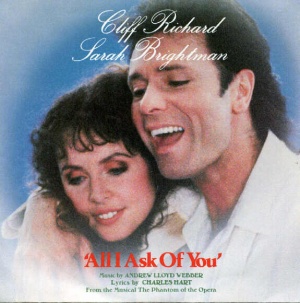
"All I Ask of You" is a song from the 1986 English musical The Phantom of the Opera, between characters Christine Daaé and Raoul, originally played on stage by Sarah Brightman and Steve Barton, respectively. It was written by Andrew Lloyd Webber, Charles Hart and Richard Stilgoe, and solely produced by Lloyd Webber. An operatic pop piece, its lyrics serve as dialogue between the two characters and discuss themes such as commitment and romance. Like Lloyd Webber's song "The Music of the Night", "All I Ask of You" was compared to the music found in Giacomo Puccini's 1910 opera La fanciulla del West.
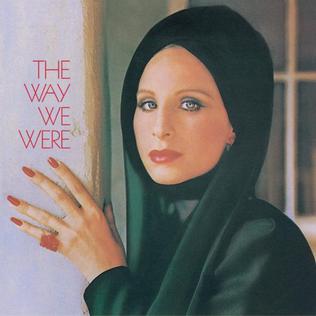
The Way We Were is the fifteenth studio album recorded by American singer Barbra Streisand. The album was released in January 1974, preceded by the commercial success of its lead single "The Way We Were" first released in September 1973.

Barbra Streisand's Greatest Hits Volume 2 is the second greatest hits album recorded by American vocalist Barbra Streisand. It was released on November 15, 1978 by Columbia Records. The album is a compilation consisting of ten commercially successful singles from the singer's releases in the 1970s, with a majority of them being cover songs. It also features a new version of "You Don't Bring Me Flowers", which was released as the collection's only single on October 7, 1978. Originating on Streisand's previous album, Songbird, the new rendition is a duet with Neil Diamond who had also recorded the song for his 1978 album of the same name. The idea for the duet originated from DJ Gary Guthrie who sold the idea to the record label for $5 million.

Lazy Afternoon is the seventeenth studio album recorded by American singer Barbra Streisand. It was released on October 14, 1975, by Columbia Records. Following a mixed critical response to her previous studio album, ButterFly (1974), the singer began working with new musicians for the project. Recorded in April 1975 in Los Angeles, Lazy Afternoon contains pop standards. Producer Rupert Holmes wrote three songs on the album and co-wrote a fourth, "By the Way", with Streisand. She also included a few cover songs, such as Four Tops' "Shake Me, Wake Me ", Stevie Wonder's "You and I", and Libby Holman's "Moanin' Low".
"Turn Your Lights Down Low" is a song by Jamaican reggae band Bob Marley and the Wailers from their 1977 album, Exodus. It is the only song on side B of the album that was not released as a single. However, a remastered version featuring Lauryn Hill was released in 1999. The duet was commercially successful, peaking at number one on the UK R&B Chart while topping the charts in New Zealand and Romania. It received a nomination for Best Pop Collaboration with Vocals at the 43rd Grammy Awards.
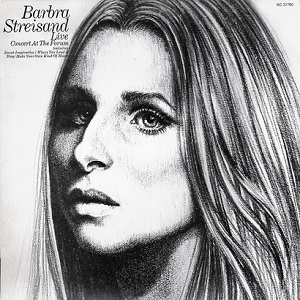
Live Concert at the Forum is the second live album by American singer Barbra Streisand, released physically on October 1, 1972, by Columbia Records. Produced by long-time collaborator Richard Perry, it was recorded at The Forum in Inglewood, part of Greater Los Angeles, on April 15, 1972, during Four for McGovern, a concert held in benefit for George McGovern's 1972 presidential campaign. A CD version of Live Concert at the Forum was released on September 6, 1989.

ButterFly is the sixteenth studio album by American singer Barbra Streisand. Released on October 1, 1974, by Columbia Records, it marked Streisand's first album of entirely new material in over three years. Primarily a contemporary pop record recorded throughout 1974, it also incorporates music from the reggae and R&B genres. All of the tracks on ButterFly are cover songs produced by Streisand's then-boyfriend Jon Peters, originating from artists like Bob Marley, David Bowie, Evie Sands, and Graham Nash.

Barbra Streisand...and Other Musical Instruments is the fourteenth studio album by American singer Barbra Streisand. It was released on November 2, 1973, by Columbia Records. The album was made available following a 1973 live television special promoted to improve Streisand's image and sound. With world music as the primary genre, the album's instrumentation varies greatly; even items such as kitchen utensils were used to create melodies and beats. With a majority of the songs on the album being cover songs, Streisand also re-recorded various tracks that originated earlier in her career. Her manager, Martin Erlichman, was credited as the album's sole and executive producer.

"Didn't We" is a song recorded by Irish singer and actor Richard Harris for his debut studio album, A Tramp Shining (1968). It was written and produced by Jimmy Webb and originally served as the B-side to Harris' 1968 single "MacArthur Park". "Didn't We" was then distributed as the record's single by Dunhill Records, also in 1968. A traditional pop song, Harris sings about his life in the past. Commercially, it charted at lower positions of both the United States and Canada, and in the higher ranks of their Adult Contemporary component charts. Harris featured "Didn't We" on several of his greatest hits albums, including The Richard Harris Collection: His Greatest Performances from 1973. That same year, the song was reissued as a promotional single paired alongside his 1971 single "My Boy".

"All in Love Is Fair" is a song by American singer-songwriter Stevie Wonder recorded for his sixteenth studio album, Innervisions (1973). Written and produced by Wonder, it was released as a 7" single in Brazil in 1974. The song is a pop ballad with lyrics that describe the end of a relationship through the use of clichés. Critical reaction to the song has been varied: Matthew Greenwald of AllMusic wrote that it was among Wonder's "finest ballad statements", but Robert Christgau felt that the singer's performance was "immature". Wonder has included it on several of his greatest hits albums, including the most recent, 2005's The Complete Stevie Wonder.

"Jubilation" is a song recorded by Canadian singer-songwriter Paul Anka for his 1972 studio album of the same name. Anka wrote the song with Johnny Harris, who also produced the track. It was released in 1972 as a 7" single by Buddah Records. A gospel song, the lyrics of "Jubilation" find the protagonist preaching about religious themes. Making a moderate commercial impact, it appeared on the record charts in both Canada and the United States. It has since been included on several of Anka's greatest hits albums and covered by The Edwin Hawkins Singers in 1973.
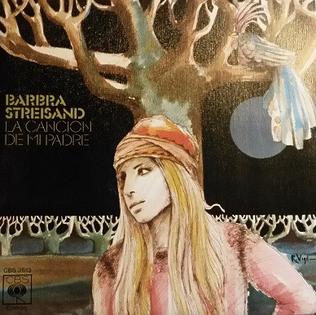
"My Father's Song" is a song recorded by American singer Barbra Streisand for her seventeenth studio album, Lazy Afternoon (1975). It was released as a 7" single in August 1975 through Columbia Records. Rupert Holmes wrote the song in collaboration with its producer Jeffrey Lesser. A sentimental ballad, "My Father's Song" was about Streisand's childhood with her father; Holmes' lyrics involve a protagonist, presumably a daughter, asking for her father's approval in life and love.

"We're Not Makin' Love Anymore" is a song recorded by American singer Barbra Streisand for her fourth greatest hits album, A Collection: Greatest Hits...and More (1989). It was released on September 14, 1989 by Columbia Records on 7-inch, 12-inch, cassette, and CD. It was written by Michael Bolton and Diane Warren and produced by Narada Michael Walden. Bolton's inspiration for the song was derived from his divorce; he and Warren debated what singer would be able to sing their work well and ultimately decided that Streisand would be the right fit. The song is a ballad that is similar in sound to Streisand's "Comin' In and Out of Your Life" (1981).

"Stranger in a Strange Land" is a song recorded by American singer Barbra Streisand for her 31st studio album, Guilty Pleasures (2005). It was released as the album's lead single on August 16, 2005, by Columbia Records. The track was written by Ashley Gibb, Barry Gibb and Stephen Gibb while production was handled by Barry Gibb and John Merchant. It serves as the first of 11 reunion collaborations with Barry Gibb, who Streisand had last collaborated with on Guilty (1980). The single was released digitally and physically distributed on CD and DVD, with some editions including the song's official music video.

"Night of My Life" is a song recorded by American singer Barbra Streisand for her 31st studio album, Guilty Pleasures (2005). It was released as the album's second single on September 27, 2005, by Columbia Records. The track was written by Ashley Gibb and Barry Gibb while production was handled by Barry Gibb and John Merchant. It serves as one of Streisand's first of 11 reunion collaborations with Barry Gibb since their work on her album Guilty in 1980. It was released digitally and on 12" and CD in five different formats, each including various remixes of the single.

"What Were We Thinking Of" is a song recorded by American singer Barbra Streisand for her 25th studio album, Till I Loved You (1988). It was released as the album's third and final single in February 1989 by Columbia Records. The track was written by Antonina Armato and Scott Cutler and produced by Denny Diante. It features guest vocals from the singer's then-boyfriend Don Johnson, who had previously collaborated with Streisand on her 1988 single "Till I Loved You".

Nuts is the soundtrack album to the 1987 American film of the same name. It was released by Columbia Records on December 21, 1987, and features five instrumental compositions by American singer Barbra Streisand. Nuts is the singer's first release since her live album One Voice, earlier in 1987, and her first soundtrack since Yentl (1983). She insisted on creating the film's score after acquiring the movie through her production company, Barwood Films.

"On a Clear Day (You Can See Forever)" is a song written by Burton Lane (music) and Alan Jay Lerner (lyrics) for the 1965 Broadway musical On a Clear Day You Can See Forever. It was subsequently performed by American actress and vocalist Barbra Streisand in the 1970 film adaptation of the musical.






















